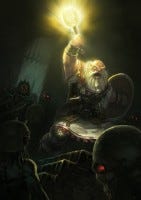Financial Options for Devs on a Budget
Developing a game always involves costs, whether you are a solo developer designing something small, or part of a larger team working on a major release. Financial considerations need to be addressed either way in order to publish successfully.

Developing a game always involves costs, whether you are a solo developer designing something small, or part of a larger team working on a major release. Financial considerations need to be addressed either way in order to publish successfully.
Firstly, the four main game models under which a game is developed:
The Lone Gunman.
The developer is the only man on the project. Coding, writing and all support are done by the developer. Graphics and sound, if used, often come from freeware. The developer also publishes the finished product.The One-man Studio.
Basically the same as the Lone Gunman profile above, except the sole developer is paid by a publisher before the game is released. Often comes with initial funding and more resources.The External Studio.
Under contract from a publisher, a team of people is hired to create a game. This is fairly similar to the one man studio, except upon a larger scale, and is one of the most popular models used today.The Internal Studio.
A publisher employs staff in-house to create a game. This is much more widely seen in the console gaming world. The biggest titles are usually developed in this manner.
Not everyone is held by economic constraints, and a hobbyist developer might create his small dream using the first model, possibly working part time to design, code, while making a living as well. The risk is all held by one man. Working under contract for a publisher, as in The External Studio, can be a great way to ensure financial security for yourself as long the work gets done. The Internal studio offers those who work for them a wage or salary, but it is not really an option for a developer with a personal dream.
What if you've created a beautiful game? You've written your lore, coded your features, built a world with you wanted and it's ready to be played. If you do not have a publisher to take over, you have to consider how you are going to both market the game to prospective customers, and how you are going to support it once you have people playing. Servers will have to be paid for, websites hosted, time has to be spent working with the players on technical and customer service issues. Everything takes time and money, and it can be difficult for a solo developer to handle everything if the game becomes even moderately successful. The main consideration when facing these issues is deciding how you want to profit off your work.
Free to Play or Pay to Play?
Free to Play usually offers everyone a free download or browser-based game, is often supported by a pay-for-perks system, and is popular among games suitable for low spec computers. First used popularly in 1997 by Achaea, a MUD game now owned by Iron Realms Entertainment, this model allows anyone to play, bash, quest, PvP, and chat with friends, all with no investment required. Extras or easy ways to advance can be purchased directly from the website, providing a boost up in different ways for those willing to shell out the money. In the case of Achaea, there are many ways to earn the often paid for currency in-game, so those without money to spend are not left out in the cold.
Pay to Play encompasses both upfront, one time fee to play games, and subscription based models. These kinds of titles often include pay for perks systems as well, in order to generate extra revenue. Pay to Play ensures the producers get paid for having a successful game similar to the console gaming industry, where a gamer pays for a game disc .
Developers often want to be altruistic and share their creations with others for no other payment than for others to enjoy them. Everyone has to eat, however, and developing a game can easily be more than a full time job. Hopefully the above gives you an idea what to be looking into to ensure you have the lights still on while managing a game.
About the author:
When not walking her dogs, cooking or working outside. Nicola Newton enjoys helping newbies and sailing the text seas in one of her favourite MUDs.
Read more about:
BlogsAbout the Author(s)
You May Also Like









